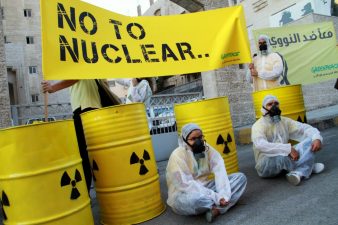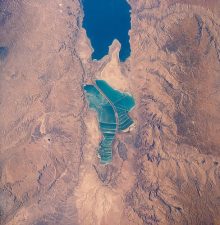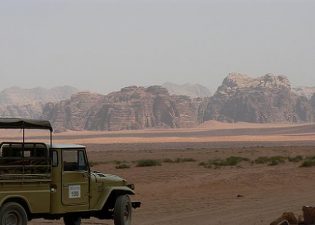[youtube]http://www.youtube.com/watch?v=8Hh0-lxNqoo[/youtube]
Earlier this month, Japan ended its love affair with nuclear power. Does Jordan begin where Japan left off?
Environmentalists applaud the shutdown of Japan’s last working reactor, but economists are not as enthused. Before the Fukushima disaster knocked out four of their 54 reactors, atomic energy provided almost 30% of the country’s electricity. All remaining reactors have been taken offline for mandatory maintenance. Severing nuclear ties provides unprecedented opportunity to transform national energy policy: ideally, Japan will tap into renewables and step up efficientcy to fill their energy production gap.
Meanwhile, in Jordan, there’s potential to revise the power strategy before catastrophe demands.
Earlier this year, The Jordan Times reported that energy officials were readying to select a vendor for the country’s first nuclear reactor: a final decision was expected in March, despite growing public resistance.
Green Prophet’s interview with anti-nuke activist Basel Burgan attracted comments from both sides of the debate. Ayoub Abu-Dayyeh, lecturer on Environment and Energy at Zaytouneh University and part of UNESCO’s international committee on clean energy, was especially engaged.
The founder and President of the Environmental Conservation and Sustainable Energy Society (CASE), Dr. Abu-Dayyeh shares his views with Green Prophet.
Green Prophet: How did you get involved in environmental issues?
I started through my profession as a civil engineer introducing thermal insulation techniques to existing buildings. Energy efficiency led me to environmental issues: I taught environmental studies at University. I later wrote a book called “Environmental Science and Philosophy”. Eventually, I connected to UNESCO on global warming issues, environmental ethics , environmental degradation, and energy transfer.
GP: What inspires you?
Mothers who demonstrate with us, they inspire me. I can see horror, shock in their faces worried about their loved ones’ future.
A 14-year-old gave me hope when she produced a video entitled No to a Nuclear Jordan. (Watch clip, above). She saw us demonstrating against nuclear in Amman. We inspired her and she reciprocated by inspiring us.
GP: What challenges face Jordan’s environmentalists?
Access to media is limited: the government doesn’t want to hear criticism of its nuclear program. Government links with civil society are minimal. Decision making is hierarchal.
Energy efficiency is at its lowest and political decisions to change are as slow as ever despite Jordan’s energy crisis being at its peak.
Government is asking people to tighten belts, yet they are incapable of reducing consumption of energy in the transportation sector, or in their own offices.
GP: What worries you about having a nuclear plant in Jordan?
Public safety; environmental degradation from mining; political implications with other countries and the International Atomic Energy Agency; corruption; radioactivity; water consumption; reprocessing and burial of nuclear waste; and decommissioning…to name a few.
GP: Why do you think renewable projects aren’t as supported as nuclear?
Bad government policies and bureaucracy , as well as strength of the nuclear lobby have allowed nuclear to over-shadow alternatives. Government policies in subsidies are very poor.
Jordan’s Renewable Energy Law was recently endorsed. The new law allows citizens with private solar or wind systems to sell excess electricity back to their power provider at full retail prices; it requires the National Electric Power Company to purchase all electricity generated by utility-scale renewable projects; and it sets up a special fund to finance new efficiency and renewable projects. It may also create opportunities for renewables developers to negotiate directly with the Energy Ministry, bypassing lengthy bidding, and expediting project development.
Better late than never.
GP: Jordan’s government is more changeable than its weather. Given their short shelf-life, politicans are free to give a strong voice to hard issues. Why is there relative silence?
Hierarchy in policy dominates the game. The elections were not as clean and fair as we thought. Politics, economy, culture and the social structure are not harmonious. The effect of multiple Ministerial changes are disastrous, I believe only 2 or 3 ministries need ministers, the others can run more efficiently without.
GP: Over half of the project brochure (six pages), “Invest in Nuclear: Jordan Nuclear Power Plant Project”, concerns financials. Safety warrants one paragraph. The environment is not addressed at all. Are environmental impacts typically assessed after project approval?
In Turkey’s nuclear project, the Environmental Impact Assessment (EIA) was thought not to be necessary for a nuclear power plant. Even ground acceleration data was reduced to cut down project costs, despite that area’s seismic activity. In Jordan, something similar might happen: an EIA or economic feasibility study has not yet been released. It’s also clear to us now that no feasible uranium deposits are available in Kingdom.
GP: Any specific philosophies guide your environmental actions?
Global perspective is a guidance, also I fight to introduce an ethical element: a clean and safe energy factor that I hope the UN will endorse to stop governments from only choosing the cheapest sources of energy.
GP: What are some of your major achievements?
My book on Thermal Insulation won a state award in 1992, and two others on Renewable Energy were accepted into the Jordanian family library.
I’m proud of having designed and built the eco-friendly Kamaliyya Residence, which won 2 international prizes.
[youtube]http://www.youtube.com/watch?v=jdTTQLYP1lI[/youtube]
And my 2010 Green Apple Award speech at the British Parliament would be on the list.
[youtube]http://www.youtube.com/watch?v=N59m_ZHarXY&feature=player_embedded[/youtube]
Just finished a high school environmental painting competition: students from ages 12-15 were asked to draw their vision of the world in crisis and how it can be approached. It will be published in a book soon, 55 paintings were involved.
But the top would be helping to overthrow the head of Jordan’s Atomic Energy Commission, and eventually stopping the nuclear program in Jordan.
GP: What’s ahead?
More books on energy efficiency and renewables and educating the public on environmental and climate change issues. I’m getting involved in television programming on these issues, and will be helping the public to install clean energy devices, mainly thermal solar panels, vacuum tubes or concentrated solar power.
GP: How can people best get involved to influence nuclear development in Jordan?
Education is key. Education about all the negative impacts of nukes: the pollution caused by mining, and the hazards of radioactivity to us and to future generations ’til life on Earth ends.
Nuclear energy is a not a way to solve global warming.
GP: Is there a message you would like broadcast to GP readers?
Please look beyond your personal wants. Try to limit your needs and thus bequeath natural resources for generations to come. Earth has been resilient to the pollution we’ve inflicted, but we pollute now at a rate that’s beyond biosystem adaptation.
If we abide by Kyoto protocol, we will still soon reach 450 PPm Co2, and this is the point of no return. I pray that the economic depression prevails into the next century: it could be the only way that pollution might be stabilized.




Thank you Dr Ayoub
particularly In Jordan , we are in dire need to maintain and protect the population from environmental pollution killer , and we urgently need to protect people from cancer and incurable diseases and diseases resulting from the negligence of State for the basic needs of people’s lives , and as long as we believe we are witnessing the decline even in the services because of lack of resources , mismanagement and rampant corruption , how could we be able to achieve maintenance and sustainability of the reactor ??? how could we do that while the successive governments can not sustain even the boiler room of any Ministry building or Hospital? ? ?
The illiterate Situation lies in the death of the institutional possess , the ability to run the cooling and maintenance of the project. If ‘ve included one example of the seriousness overlooked for the protection of people and the country , such as the sinking of the country under the normal ratio rain compared to tropical rain in any behind ( as we claim savagely ) country Sri Lanka , which is considered illiterate and among the poor and underdeveloped countries ? ? The sinking of the country under normal ratio rain and what we have seen last night 1/11/2013 and the water’s exposure of the country , and the loss of services which covered the people by Mud to suck lives , this is as a result of negligence and recklessness demonstrates the enormity of the corruption that will be executed to sustain any way similar to the reactor project !!! .
Please read about the mutations in butterflies after Fukushima
Visit facebook
Nuclear Free Jordan
http://www.greenprophet.com/2012/08/mutant-butterflies-fukushima-middle-east-nuclea/?utm_source=feedburner&utm_medium=email&utm_campaign=Feed%3A+greenprophet+%28Green+Prophet%29
Happy to help broadcast your message!
Thank you Laurie for giving me the opportunity to share my perceptions and experiences to many people, I look forward to being more helful…